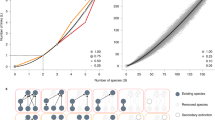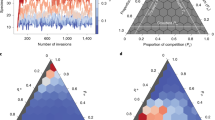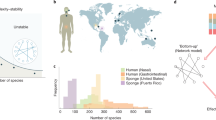Abstract
MAY1 drew an analogy between large randomly connected cybernetic networks2,3 and ecosystems. His analysis of stability criteria for such networks seems to contradict the traditional ecological hypothesis that ecosystem diversity contributes to functional stability4–7. May's analytical solution for large matrices in which each element by itself is stable showed that1 “too rich a web connectance or too large an average interaction strength leads to instability. The larger the number of species, the more pronounced the effect”. As the number of elements in the matrix increases, the transition region between stability and instability becomes increasingly narrow1–3. Thus, a complex system perched near this transition region is subject to a self-generating catastrophe upon only a minor modification of system parameters. If these models are applicable to real ecosystems, they obviously have immense implications for resource management as well as ecological theory. I report here an application of May's conclusion to a real ecological system.
This is a preview of subscription content, access via your institution
Access options
Subscribe to this journal
Receive 51 print issues and online access
$199.00 per year
only $3.90 per issue
Buy this article
- Purchase on Springer Link
- Instant access to full article PDF
Prices may be subject to local taxes which are calculated during checkout
Similar content being viewed by others
References
May, R. M. Nature 238, 413–414 (1972).
Ashby, W. R. Design for a Brain (Chapman and Hall, London, 1952).
Gardner, M. R. & Ashby, W. R. Nature 228, 784 (1970).
Bertalanffy, L. von Science 111, 23–29 (1950).
MacArthur, R. H. Ecology 36, 533–536 (1955).
Odum, E. P. Japanese J. Ecol. 12, 108–118 (1962).
Margalef, R. Am. Nat. 97, 357–374 (1963).
May, R. M. Stability and Complexity in Model Ecosystems (Princeton University, 1973).
De Angelis, D. L. Ecology 56, 238–243 (1975).
Lawlor, L. R. Am. Nat. 112, 445–447 (1978).
Poole, R. W. An Introduction to Quantitative Ecology, 336 (McGraw-Hill, New York, 1974).
Yarranton, G. A. J. Ecol. 54, 229–237 (1966).
Turkington, R. A. thesis, Univ. Wales (1975).
Turkington, A. A., Cavers, P. B. & Aarssen, L. W. Can. J. Bot. 55, 2701–2711 (1977).
Harper, J. L. J. Ecol. 55, 247–270 (1967).
McNaughton, S. J. (in preparation).
Margalef, R. Perspectives in Ecological Theory, 7, (University of Chicago, 1968).
MacArthur, R. W. Geographical Ecology, 29, 43–45 (Harper and Row, New York, 1972).
Root, R. B. Ecol. Monogr. 37, 317–350 (1967).
Watson, R. M. thesis, Cambridge Univ. (1967).
Oosting, H. J. The Study of Plant Communities, 77–78 (Freeman, San Francisco, 1958).
Author information
Authors and Affiliations
Rights and permissions
About this article
Cite this article
MCNAUGHTON, S. Stability and diversity of ecological communities. Nature 274, 251–253 (1978). https://doi.org/10.1038/274251a0
Received:
Accepted:
Published:
Issue Date:
DOI: https://doi.org/10.1038/274251a0
This article is cited by
-
Effects of stocking rate on the interannual patterns of ecosystem biomass and soil nitrogen mineralization in a meadow steppe of northeast China
Plant and Soil (2022)
-
Impacts of sub-micrometer sediment particles on early-stage growth and survival of the kelp Ecklonia bicyclis
Scientific Reports (2020)
-
Subsistence Transitions and the Simplification of Ecological Networks in the Western Desert of Australia
Human Ecology (2019)
-
Spatial compartmentation and food web stability
Scientific Reports (2018)
-
Multiple facets of biodiversity drive the diversity–stability relationship
Nature Ecology & Evolution (2018)
Comments
By submitting a comment you agree to abide by our Terms and Community Guidelines. If you find something abusive or that does not comply with our terms or guidelines please flag it as inappropriate.



